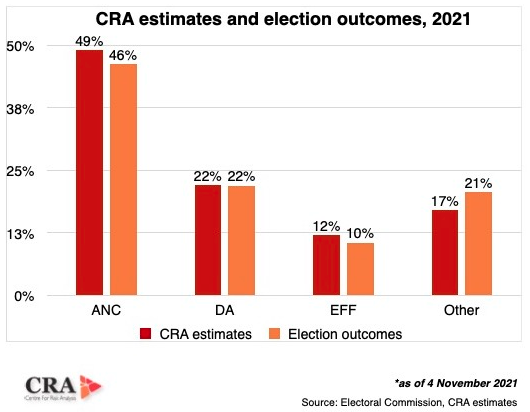![[Opinion] ANC’s hegemony is over: a new era has begun [Opinion] ANC’s hegemony is over: a new era has begun](https://cra-sa.com/media/opinion-anc2019s-hegemony-is-over-a-new-era-has-begun/@@images/2b1acc1b-42f4-4a72-a195-0a5e144ad303.jpeg)
In the aftermath of the 2021 municipal elections these are the key trends we expect will emerge from South Africa’s new political alignment.
The elections marked a watershed moment in South Africa’s politics. For the first time, support for the ruling ANC dipped below the critical 50% mark, as the party achieved a mere 45.6% aggregate. After decades of dominance, the once mighty buffalo that roamed the country’s political savannah is now wounded and weakened.
This did not come as a surprise to our team of analysts at the Centre for Risk Analysis (CRA); in September 2021 we forecast a share of 49% for the ANC in the local polls. However, we first made the call on the end of ANC dominance as long ago as July 2012, noting at the time that multiple socio-economic indicators pointed to a sustained decline in ANC support, culminating in the party losing its parliamentary majority at the 2024 national and provincial elections. This outcome seems likely after the November local government poll.

Voter turnout
Just 45.2% of registered voters voted, and only 29.5% of eligible voters did so – the lowest voter turnout ever. There is now a very large pool of potential voters up for grabs, and public protests will continue to escalate from their already high levels as people express their political frustrations through means other than the ballot.
Party performance
Although the ANC remains the largest party, it failed to secure electoral majorities in all but two of South Africa’s eight metropolitan areas (Buffalo City and Mangaung).
The DA also experienced reversals, receiving 21.7% in aggregate support, down from 26.9% in 2016. It does, however, remain the second-largest party in all metros, except for CapeTown, where it maintained its status as the majority party, and Nelson Mandela Bay, where it is tied with the ANC on 48 seats, despite having received slightly more votes. The DA further secured its first municipality in KwaZulu-Natal (Umngeni) and increased its majority in Gauteng’s Midvaal municipality.
The EFF saw modest growth compared to the 2016 local elections, with aggregate support rising from 8.2% to 10.3%. Although both parties have a shared history and ideology, ANC losses did not necessarily translate into EFF gains. However, the EFF performed well in KwaZulu-Natal and could see itself as kingmaker in eThekwini coalition talks.
Other parties gained much support, with newcomers ActionSA winning notable support in Gauteng. The Inkatha Freedom Party (IFP), the Freedom Front Plus (FF+) and the Patriotic Alliance (PA) increased their share of votes at the expense of the major parties. Cumulatively, the smaller parties – all those excluding the ANC, DA and EFF – grew their share of the vote from 11% to 22%.
The Buffalo v Wild dogs
There now exists a scenario where these parties, like a pack of wild dogs hunting the great old buffalo and its calf, collaborate to confront the ANC and the EFF in 2024.
Do not be surprised if individual members of the pack squabble and bite one another, for that is in the nature of dogs (and political parties), but if they are mindful of their main objective, the hunt may well be successful.
Can the wild dogs cooperate at local government level?
A third of municipalities – 70 out of 213 – have hung councils, where no single party has an outright majority (in 2016, this was the case in just 27 municipalities). In all these councils, political parties will have to overcome their differences to form sustainable coalitions. Many councils will repeatedly collapse and re-form.
Looking ahead
As we argued in a recent Macro Review report, we expect the following key trends to emerge: first, South Africans will continue to check out of the electoral process. Second, the ANC’s share of the vote will likely remain below 50% in the 2024 national and provincial elections. Third, coalition politics will become the norm but will also be highly unstable.
And, finally, service delivery is unlikely to improve, given the incapacity of the ANC and the fragile nature of coalitions.
This article originally appeared here.